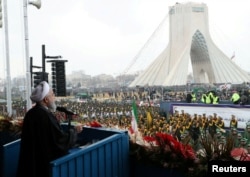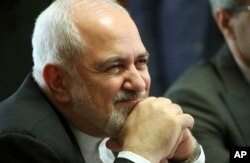Hundreds of thousands of Iranians marched and some burned U.S. flags to mark the revolution's 40th anniversary on Monday as Tehran showed off ballistic missiles in defiance of U.S. efforts to curb its military power.
Soldiers, students, clerics and black-clad women holding small children thronged streets across Iran, many with portraits of Ayatollah Ruhollah Khomeini, the Shi'ite cleric who toppled the Shah in an Islamic uprising that still haunts the West.
On Feb. 11, 1979 Iran's army declared its neutrality, paving the way for the fall of U.S.-backed Shah Mohammad Reza Pahlavi.
State television showed crowds defying cold rainy weather and carrying Iranian flags while shouting "Death to Israel, Death to America" — trademark chants of the revolution.
After decades of hostility with the United States, the Islamic Republic vowed to increase its military strength despite mounting pressure from Western countries.
Ballistic missile capabilities were on display during the main march, including the Qadr F, a ground-to-ground missile with a 1,950-km (1,220-mile) range, Tasnim news agency said.
"We have not asked and will not ask for permission to develop different types of ... missiles and will continue our path and our military power," President Hassan Rouhani said in a speech at Tehran's Azadi (Freedom) square.
Economic ‘hardships and grievances’
U.S. President Donald Trump tweeted on Monday that the Iranian government had let down its people. "40 years of corruption. 40 years of repression. 40 years of terror. The regime in Iran has produced only #40YearsofFailure. The long-suffering Iranian people deserve a much brighter future," he posted in both English and Farsi.
The large turnout in state-sponsored rallies, in which U.S. and Israeli flags were burned, came as Iranians face mounting economic hardships many blame on the country's clerical leaders.
Pictures on social media showed some people also demonstrating against corruption, unemployment and high prices. "Our presence in the 40th anniversary of the revolution is to show our support for the Islamic Republic," said one sign held by a protester. "But it does not mean we support corruption of some officials and their betrayal of the oppressed people."
Reuters could not independently verify the pictures.
Last year, Iran cracked down on protests over poor living standards that posed the most serious challenge to its clerical elite since a 2009 uprising over disputed elections.
Prices of basic foodstuffs have soared since President Donald Trump withdrew Washington from world powers' 2015 nuclear deal with Iran last year and reimposed sanctions on Tehran. "I bow in admiration to Iran's resilient people who — despite hardships and grievances — today poured into streets by the millions to mark 40th anniversary of their Islamic Revolution, which some in the US wished would never come," Iranian Foreign Minister Mohammad Javad Zarif tweeted.
"US should take note: REAL Iranians never succumb to diktats."
In January, Rouhani said Iran was dealing with its worst economic crisis since the Shah was toppled.
But he remained defiant on Monday as Iranians recalled the end of a monarch who catered to the rich. "The Iranian people have and will have some economic difficulties but we will overcome the problems by helping each other," he said.
U.S. and Israeli threats
Yadollah Javani, the Iranian Revolutionary Guards' deputy head for political affairs, said Iran would demolish cities in Israel if the United States attacked.
"The United States does not have the courage to fire a single bullet at us despite all its defensive and military assets. But if they attack us, we will raze Tel Aviv and Haifa to the ground," Javani told the state news agency IRNA.
Israeli Prime Minister Benjamin Netanyahu dismissed the threat. "I am not ignoring the threats of the Iranian regime, but nor I am impressed by them," he said.
"Were this regime to make the terrible mistake of trying to destroy Tel Aviv and Haifa, it would not succeed, but it would mean that they had celebrated their last Revolution Day. They would do well to take that into account."
Washington and the Arab world have viewed Iran with great suspicion since the Islamic Revolution, fearing Khomeini's radical ideology would inspire militants across the Middle East. Today, the United States, its Arab allies and Israel are trying to counter Tehran's growing influence in the Middle East, where it has proxies in Syria, Lebanon and Yemen.
Iran also has vast clout in Iraq, where Major-General Qassem Soleimani, head of the overseas arm of the Revolutionary Guards, was frequently photographed guiding Shi'ite militias in the war against Sunni Islamic State militants.









